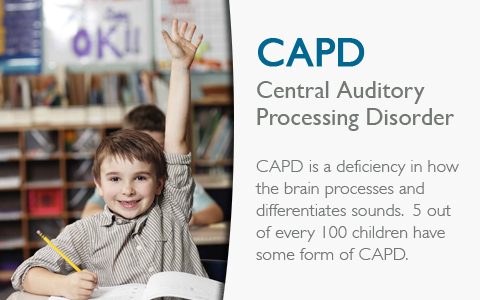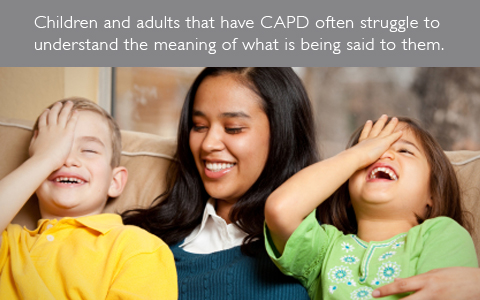Central Auditory Processing Disorder
- Home
- CAPD
Central Auditory Processing Disorder
Achieve Hearing & Rehabilitation offers a complete CAPD (Central Auditory Processing Disorder) evaluation with an audiologist and a speech-language pathologist. Achieve offers comprehensive treatment for CAPD with speech-language pathologists who are knowledgeable about how CAPD affects learning and language. The speech-language pathologist will partner with you to develop a treatment plan to meet your child's specific needs.
Did you know?
The diagnosis of CAPD must be determined by an Audiologist and provide information about both developmental and acquired disorders of the central auditory system.
-
What is CAPD?

A Central Auditory Processing Disorder (CAPD) is a deficiency in the way the brain processes verbal/auditory information. Children and adults who have CAPD often struggle to understand the meaning of what is being said to them. Some people are born with CAPD, whereas other people acquire it later in life.
Facts About CAPD
- A deficiency in how the brain processes and differentiates sounds
- It occurs in 5 out of every 100 children
- Children with a CAPD have normal hearing
- There is no one cause of a CAPD. In many children it's related to developmental delays in the auditory centers of the brain
- It is caused by, but not limited to: premature birth, trauma, degenerative disorders, viral infections, lead poisoning, severe ear infections early in childhood, head trauma, and stroke
A CAPD Occurs With / Not Caused By
- Speech & language disorders
- Attention Deficit/Hyperactivity Disorder (ADHD)
- Learning disabilities
- Dyslexia
- Social or emotional problems
- Autism
CAPD Sign & Symptoms

Signs of CAPD are not exclusive to the disorder, but if your child exhibits some of the following signs or symptoms, they may be at risk of a central auditory processing disorder (CAPD) and benefit from specialized auditory testing.
If your child exhibits some of these signs call Achieve Hearing & Rehabilitation today. We can discuss the auditory testing options Achieve uses to assess central auditory function and help your child strive toward a more balanced life.
Signs & Symptoms of CAPD
- Difficulty following verbal directions
- Trouble understanding information presented in the classroom
- Challenges with spelling because there is a tendency to confuse similar sounding words
- Exhibits frustration when trying to follow long conversations
- Difficulty following multi-step directions
- Noisy environments upset or confuse your child. They perform better in quiet environments or on tasks that don't rely heavily on listening (e.g., reading or math)
CAPD Testing and Diagnosing

Achieve Hearing & Rehabilitation offers a complete CAPD (Central Auditory Processing Disorder) evaluation with an audiologist and a speech-language pathologist.
CAPD testing is completed in two parts. The first part is with an Audiologist. The Audiologist looks at how the brain processes sounds. The second part is with a speech-language pathologist. The speech-language pathologist evaluates how CAPD impacts language and learning.
At Achieve Hearing & Rehabilitation, CAPD testing is individualized based on each person. The selection of tests will depend upon a number of factors, including the age of the person, the signs or symptoms the person exhibits, the person's native language, cognitive status, and other determining factors.CAPD Testing with the Audiologist
-
The American Speech-Language-Hearing Association (ASHA) states that CAPD needs to be assessed and diagnosed by an Audiologist (ASHA Technical Report "Central Auditory Processing Disorders" January 2005). CAPD is diagnosed through specialized tests designed to assess the auditory centers of the central nervous system. The tests fall into two major categories: hearing acuity tests and auditory processing tests.
Hearing Acuity Tests
- Diagnostic Audiological tests
- Otoacoustic Emissions test
- Acoustic Reflex tests
- Uncomfortable Loudness Levels tests
Auditory Processing Tests
- Monaural low-redundancy speech tests
- Dichotic speech tests
- Temporal patterning tests
- Binaural interaction tests
- Speech understanding in noise tests
- Filtered words tests
- Competing words tests
- Competing sentences tests
- Time compressed sentences test
Testing with the Speech-Language Pathologist
-
The speech-language pathologist will meet with the parent to learn how the child's ability to process auditory information has impacted the child's life at school, home and social situations. The comprehensive evaluation may target:
- Comprehension of auditory directions
- Phonemic awareness
- Auditory comprehension
- Problem solving
- Auditory reasoning
- Expressive and receptive language Following CAPD testing, the audiologist and speech-language pathologist with will meet with the parent to discuss results. If treatment is indicated, therapy can be scheduled with one of the speech-language pathologists at Achieve Hearing.
CAPD FAQs

If you have additional questions about CAPD, contact Achieve Hearing & Rehabilitation. We provide you the best services possible by establishing individualized relationships with our patients.
Frequently Asked Questions
-
Can CAPD hinder a child's educational development?
Yes.Speech and language skills are developed most efficiently through hearing, which means it is not unusual to observe speech and language problems, as well as academic problems in children with CAPD.
If a child experiences difficulty in processing the brief and rapidly changing acoustics of spoken communication, they are likely to have problems recognizing the important intricacies of language. -
Is CAPD curable?
Although there is no medical cure (medicine, surgery, etc.) there are many treatment options available through a variety of techniques that incorporate speech-language therapy.Achieve offers comprehensive, individualized evaluations and treatment for CAPD. Achieve's speech-language pathologists are licensed and specifically trained about how CAPD affects learning and language.
Treatment of CAPD may involve a multidisciplinary approach. Other professionals that may be included in the treatment process: the child's teacher(s), reading specialist (RSP), psychologist, and neurologist. -
If my child is diagnosed with CAPD, does it mean they have hearing loss?
Children with CAPD have normal hearing. Their processing problems will not be detected by traditional routine hearing exams. Specialized hearing tests and processing tests must be administered to diagnose a person with CAPD. Speech language pathologists and psychological tests can identify CAPD characteristics; however, an audiologist must complete the testing to diagnose CAPD.
-
Types of Hearing Loss
There are three types of hearing loss. At Achieve Hearing & Rehabilitation, we can help you with Conductive hearing loss, Sensorineural hearing loss, and Mixed hearing Loss.
Read more -
Speech Therapy
Every person receives a comprehensive evaluation - strengths and growth areas are identified - treatment plans are developed to specifically target the person's needs.
Read more -
Clinic Hours
-
Monday - Thursday
9:00 - 6:00pm
-
Friday
1:00 - 6:00pm
-
Lunch Noon - 1:00pm
Closed
-
Monday - Thursday




